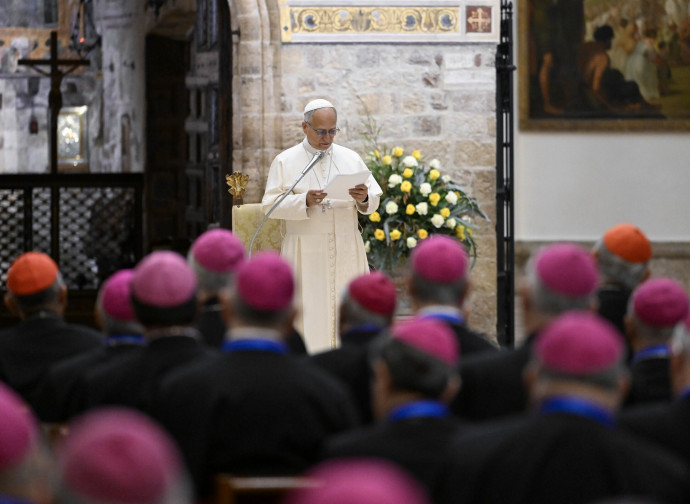Pope Leo dreams of a synodal and interventionist CEI in Assisi
What will the Church in Italy be like in the Prevost era? Some clues can be found in the city of St Francis, where the Pope concluded the general assembly of Italian bishops by calling for intervention in the public arena. There were two indications of governance, and no U-turn on the Synod

In his book Lo stivale e il cupolone (The Boot and the Dome), journalist and writer Mauro Mazza presents Italy and the Holy See as a couple in crisis, orphaned by the "Italian exception" of Wojtyla's memory. There is no doubt that the decline in the authority of the Italian episcopate, as well as Francis's anti-Italian prejudice, have contributed to this situation.
What will become of the Italian Church under Leo XIV? Some clues emerged from Assisi yesterday, where the new Pope concluded the 81st General Assembly of the Italian Episcopal Conference (CEI). Almost two hundred bishops were in attendance, and some programmatic indications are worth mentioning. Firstly, Leo said that, 'It is good to respect the rule of 75 years for the conclusion of the service of Ordinaries in dioceses and, only in the case of Cardinals, may a continuation of ministry be considered, possibly for another two years'. The Pope, who has a degree in mathematics, is precise with numbers which he doesn’t use casually. If he has been so precise on deadlines, we can expect this to become the norm for the future. Without the exceptions based on personal preferences that we have seen over the last twelve years, this is a criterion that Italian bishops will have no difficulty accepting.
Another governance-related indication concerns the merging of dioceses. Reducing the number of Italian dioceses has long been a preoccupation of Bergoglio's. The process began in 2019 and has inevitably encountered resistance in a country with such strong territorial identities. Prevost was clear: 'the challenges of evangelisation and the changes of recent decades, which affect the demographic, cultural and ecclesial spheres,' he said, 'ask us not to withdraw on the issue of diocesan mergers'. This is a plan that, according to forecasts by his predecessor, should have taken fifteen years, and will therefore continue under the new pontificate.
Pope Francis also wants an interventionist episcopate, presumably based on the model already recommended to US bishops. 'The Church in Italy,' he said yesterday in Assisi, 'can and must continue to promote an integral humanism that supports the existential journeys of individuals and society, and exalts the value of life and care for every creature. It must intervene prophetically in public debate to spread a culture of legality and solidarity.' In recent years, the bishops have favoured certain themes over others, and it remains to be seen whether the new Pope's wish will be fulfilled across the board.
The Church of Italy that Leone envisages is not too dissimilar to that imagined by his predecessor. Its pillars must be 'proclaiming the message of salvation, building of peace, promoting human dignity, a culture of dialogue and fostering a Christian anthropological vision', which, he recalled, 'correspond to the perspectives that emerged during the Synodal Journey of the Church in Italy'. The Pope urged, 'it is now up to you, Bishops, to outline the pastoral guidelines for the coming years', and offered advice ‘so that a truly synodal spirit may grow and mature in the churches and among the churches of our country'. Leone called for 'effective communion', which he believes requires 'the face of a collegial Church, which shares common steps and choices, may take shape'.
In short, the new Pope certainly did not reject the Summary Document of the Synodal Path of the Churches in Italy, often attributed to CEI President Matteo Maria Zuppi, but actually written mainly by Monsignor Erio Castellucci, President of the National Committee of the Synodal Path. However, he did remind the bishops of their role, as they will be responsible for deciding which of the 124 proposals to implement.
However, at the end of the assembly, many bishops could not hide their disappointment at the speech's clear continuity. Some had hoped to move on from the radical phase of synodality: it is no secret that Francis imposed the National Synod on a very reluctant episcopate.
